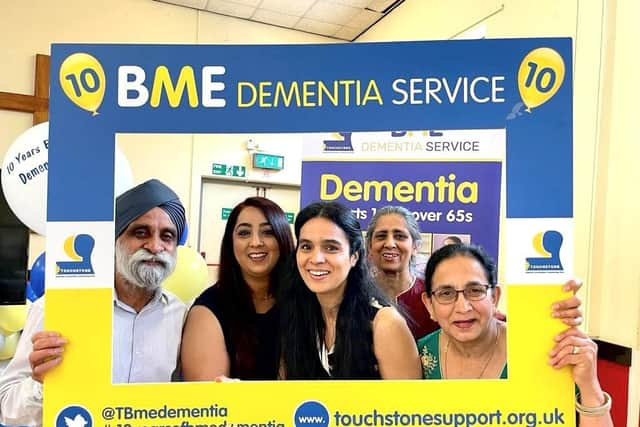Meet the woman who has spent over a decade helping people with dementia in Leeds
and live on Freeview channel 276
She is the coordinator of the Touchstone BME Dementia Service, which cares for people from black and minority ethnic backgrounds.
The service recently celebrated its 10th birthday and Ripaljeet has been “amazed” by the way in which it has grown during its existence.


Advertisement
Hide AdAdvertisement
Hide Ad"It's just amazing to see how we've grown and evolved over the years,” she said. “We’ve achieved so much and we’ve supported so many people.
"The difference we make to people’s lives is really important to me.
"You feel people are being supported and they’re accessing services they can benefit from. For example, having carers that speak the language they can speak and can relate to, it’s amazing.”
The service strives to ensure people are comfortable and can understand what is going on around them as much as possible.
Advertisement
Hide AdAdvertisement
Hide AdA dementia café for those from South Asian backgrounds is one of the services they run and the language used at the café is an example of how accessibility to the service is maximised.
“We run a dementia café, which is for people from South Asian backgrounds,” Ripaljeet said. "It's a weekly café and we run it in a mother tongue. All the activities that are run during the café are culturally sensitive.
“One of the long-term symptoms could be they revert back to their mother tongue.
"They might have learned English when they came here but so they can go back to their mother tongue when they have dementia.”
Music is also something which is carefully chosen.
Advertisement
Hide AdAdvertisement
Hide Ad"With music, we’ve always chosen something they can relate back to, like Bollywood music from the 1940s, 50s and 60s,” she explained. “They love singing along, music is really good for people with dementia.”
The service also runs games of ‘food bingo’, which are also tailored to ensure participants can relate and understand.
"They love bingo,” Ripaljeet explained. “We’ve adapted it – we put pictures of ginger garlic in and Indian vegetables, things they might recognise and be able to relate to.
"It’s really important because there’s no point running the group if they can’t relate to any of the activities.”
Advertisement
Hide AdAdvertisement
Hide AdThe service covers the entirety of Leeds but their offices are based in Harehills.
Having been in operation for over a decade, the service has dealt with numerous challenges.
However, the Covid-19 pandemic brought fresh problems they had not previously encountered.
"I think we're really struggling at the moment, especially after lockdown,” Ripaljeet explained. “There's a lot of people we work with and their dementia has progressed.
Advertisement
Hide AdAdvertisement
Hide Ad"I think that has happened regardless of what community you come from, it has happened to a lot of people with dementia, just because they've lost their routine, they've not had any respite, they were stuck at home.
"I think a lot of people have lost the confidence to come to the groups, to go out for walks and stuff.
"We're getting there slowly but I think they’re the main difficulties we're facing with our clients at the moment.”
Breaking down taboos and raising awareness is something the team behind the service are passionate about.
Advertisement
Hide AdAdvertisement
Hide Ad“We've worked really hard just to break the stigma and taboo around dementia,” Ripaljeet said. “In five South Asian languages, there's no word for dementia and the closest one would be [saying] someone's gone mad.
"I think it's really important for people to recognise that dementia is like any other illness."
Ripaljeet and her colleagues are also determined to spread the message that early diagnosis is pivotal in the supporting of those with dementia.
“The idea is to get people go see the GP at the earliest [possible time] and the diagnosis can be made at very early stages, because then they can be supported.
"People can still live well with dementia but with the right support in place – that's crucial.”
